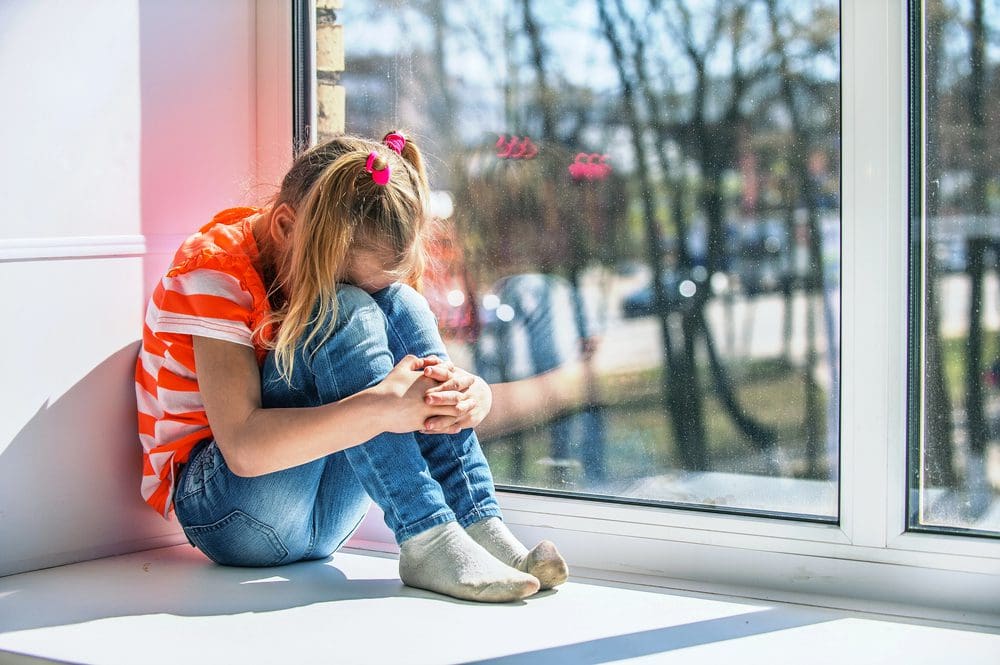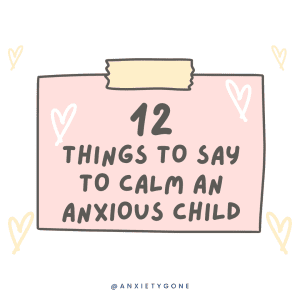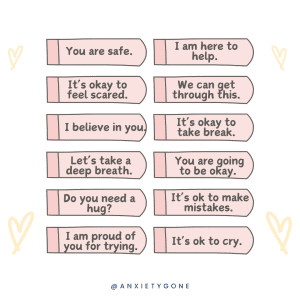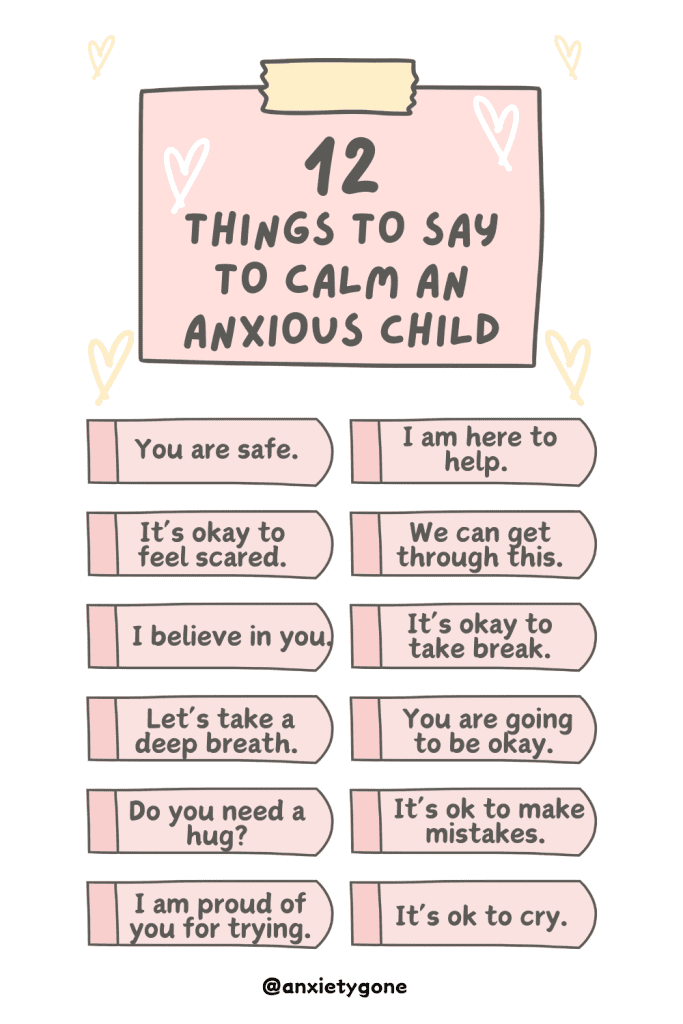Full Disclosure: Clicking on these links could mean a tiny commission for me, at no extra cost to you.
Just when you think you’ve got this whole parenting thing down, your child starts showing signs of anxiety and you have no idea what to do. Anxiety in children manifests in various ways, from nervous habits to full-blown panic attacks and parenting an anxious child can be a challenging and emotional journey for you too. As a parent or caregiver, finding the right words to soothe and reassure an anxious child is crucial. This article explores 27 calming phrases that can help ease anxiety in children, providing them with the comfort and support they need.
Calm Your Child's Mind with Headspace
Discover guided meditations designed specifically for kids to help them relax, focus, and manage their emotions. Sign up today to receive a 14-day free trial with Headspace.
Free Trial
What is Child Anxiety?
Child anxiety refers to excessive fear or worry that interferes with a child’s daily life. It can be triggered by numerous factors, including school, social interactions, or changes in routine. Recognizing the signs of anxiety in children is the first step in addressing their needs.
Signs of Anxiety in Children
Children with anxiety may exhibit physical symptoms like headaches, stomachaches, or fatigue. Behaviorally, they might avoid certain situations, seek constant reassurance, or have difficulty concentrating. Emotional signs include irritability, excessive worry, and frequent crying.
The Importance of Addressing Child Anxiety
Ignoring anxiety in children can lead to more severe mental health issues later in life. Addressing their anxiety early helps build coping mechanisms, resilience, and emotional intelligence.
27 Things to Say to Calm an Anxious Child
Finding the right words to comfort an anxious child can be challenging but incredibly impactful. The phrases we use can help soothe their worries, validate their feelings, and provide them with a sense of security and support. Here are 27 effective things to say to calm an anxious child, each designed to ease their anxiety and strengthen their emotional resilience. These phrases are practical tools for parents, caregivers, and anyone involved in the well-being of children with anxiety.
1. “It’s okay to feel scared.”
It’s important to reassure your little one that this feeling they’re having is okay, they’re okay to feel it and they’re okay for feeling it. Validate their feelings. Let them know that it’s normal to feel anxious sometimes.
2.“I’m here for you.”
Assure your anxious child that they are not alone. Knowing that someone is there to support them can be incredibly comforting.
3.“It’s okay to take a break.”
Let them know that it’s fine to step away from stressful situations. Breaks can provide much-needed relief. Many children feel trapped when they have an anxiety attack. They feel the need to run, but they also feel like they can’t run. They think about how you will feel or react if they have to walk out in the middle of a wedding (been there), run out of a restaurant (done that) or take 10 minutes to enter someone else’s home (you guessed it – my name is written all over it).
Tell your anxious child that if they need to leave to take a walk or breather outside, that’s totally okay.
The key is to not let them leave or avoid the situation completely. . It’s like falling off a horse. They have to get back into the situation that spooked them, so they can learn how to handle it. If they have to leave 100 times, that’s completely okay but get them back in there.
4. “Can you tell me what’s worrying you?”
Invite an anxious child to express their fears. Sometimes, just talking about their anxiety can help lessen its intensity.
5. “You are safe. I am here.”
Reassure an anxious child that you’re there for them, you’re not going to leave them, they are safe and that you love them. It’s amazing what a bit of reassurance can do for children with anxiety.
6. “We can get through this together.”
Reassure them that you will face the anxiety together. This partnership can make them feel more secure.
7. “Let’s think of a happy place.”
Guide them to visualize a safe and happy place. This can distract them from their current anxiety and bring about a sense of calm. Think about the amusement park or the playground you went to last week. Encourage them to visualize the sounds, tastes, sights, textures – everything.
8. “What can we do to make this better?”
Empower children experiencing anxiety by asking for their input on solutions. This gives them a sense of control over their anxiety. If they are struggling to find an answer, give them some suggestions like deep breathing, tapping exercises or as mentioned previously, guided imagery.
Help Your Anxious Child Today
Help your child manage stress and anxiety with The Tapping Solution. Discover simple, effective tapping techniques that can bring instant relief and build emotional resilience. Start your child's journey with a 14 days free!
Start Your Free Trial Today!9. “Can you count how many trees we can see? What about the colours around us?”
The best way to soothe a nervous system is to distract the mind. Ask your child questions that force them to think about something other than the racing thoughts and anxious feelings they’re experiencing.
10. “Remember when you felt better after we…”
Remind them of past successes in overcoming anxiety. This can help build their confidence.
11. “Let’s count to ten together.”
Use counting as a grounding technique. It can distract and calm an anxious child.
12. “Can you tell me what you’re thinking or feeling?”
The key here is to redirect their thoughts. Give them something new to think about. Distract the mind.
13. “I believe in you.”
Express your confidence in their ability to cope with anxiety. This belief can be incredibly empowering.
14. “Let’s focus on one thing at a time.”
Help them break down overwhelming tasks into manageable parts. This reduces feelings of being overwhelmed.
15. “I am here to help you. You’re going to be okay.”
Reassurance 101. Sometimes, all an anxious child needs to hear is that they are not alone and that they’re supported.
16. “Let’s take a deep breath together.”
Deep breathing is one of the best natural cures for anxiety. It can bring your child right out of the panic. Guide them to envision themselves as a balloon, or a beach ball. Get creative and make silly faces like with a lion’s breath.
17. “Can you show me how you’re feeling?”
Encourage them to express their feelings through drawing or writing. This can be a non-verbal way to process emotions.
18. “Let’s shake it out. Shake out your arms and now your legs.”
This calming method is a distraction tactic that also encourages fidgeting, which allows anxious children to release nervous energy.
19. “It’s okay to make mistakes.”
Normalize making mistakes. This reduces the pressure they might feel to be perfect.
20. “Anxiety can sometimes feel like a monster. What would your monster look like right now?”
Yet another characterization tactic that allows your child to express themselves creatively while distracting their mind. It also allows you, as the parent, to understand what they’re feeling.
21. “Let’s sing your favourite song. Can you sing with me.”
Distract the anxious mind with a pleasant experience, such as a favourite song from the radio or cartoon. Better yet, encourage them to hum to their favourite tune to massage their vagus nerve and induce a sense of calm.
22. “Let’s try to relax our muscles together.”
Guide them through a progressive muscle relaxation exercise. This helps reduce physical tension and promotes a sense of relaxation.
23. “Can you count backward from ____.”
The secret to this diversion tactic for anyone parenting a child with anxiety is to adjust the number to the child. For example, suggest counting to 10 for little tots or saying the alphabet backward for older kids. This coping technique has to be difficult enough so they have to think, but easy enough that it doesn’t stress them out further. You don’t have to actually count the entire thing (especially if it’s 100) but long enough for the anxiety to subside.
24. “I’m proud of you for trying.”
Acknowledge their efforts. Trying is a significant step in managing anxiety.
25. “Let’s take it one step at a time.”
Encourage gradual progress. Small steps are less intimidating and more achievable.
26. “It’s okay to cry.”
Allow them to express their emotions. Crying can be a healthy way to release anxiety.
27. “How can I help you right now?”
Offer immediate assistance. This shows your willingness to support them in the moment. What do they need? A hug? Space? Give them the opportunity to tell you exactly what they need.
Practical Tips for Parents of Anxious Children
Creating a Calm Environment
A calm home environment can significantly reduce anxiety in children. Soft lighting, quiet spaces, and a predictable routine can help create a sense of security.
Teaching Coping Mechanisms
Teach your child various coping strategies such as deep breathing, visualization, and mindfulness. These tools can empower them to manage their anxiety independently.
Seeking Professional Help
If your child’s anxiety is severe, consider seeking professional help. Therapists and counselors can provide specialized support and treatment.
FAQs about Helping an Anxious Child
What are the common signs of anxiety in children?
Common signs include excessive worry, avoidance of certain situations, physical complaints like headaches or stomachaches, irritability, and difficulty concentrating.
How can I help my child with anxiety?
Provide a supportive and understanding environment, teach coping mechanisms, and seek professional help if necessary. Encourage open communication about their fears.
Is it normal for children to experience anxiety?
Yes, it’s normal for children to experience anxiety at times. However, if it interferes with their daily life, it may require additional support.
Can exercise help reduce anxiety in children?
Yes, regular physical activity can help reduce anxiety by releasing endorphins and providing a healthy outlet for stress.
How can I create a calm environment for my anxious child?
Create a predictable routine, ensure a quiet and safe space, and use calming techniques such as soft lighting and soothing music.
When should I seek professional help for my child’s anxiety?
If your child’s anxiety is severe, persistent, or interfering with their daily activities, it may be time to seek professional help.
Conclusion
The words you speak play a huge role in the amount of anxiety your child experiences. You have to be able to put your anger, frustration, and stress on hold because your child needs you. They need to hear you and feel your unconditional love and support. A negative reaction from you, their person, will only worsen their anxiety disorder. So, remember: patience and understanding is the right approach. By using these 27 calming phrases and practical tips, you can help your anxious child feel more secure and confident.
Infographics About Helping Anxious Children












